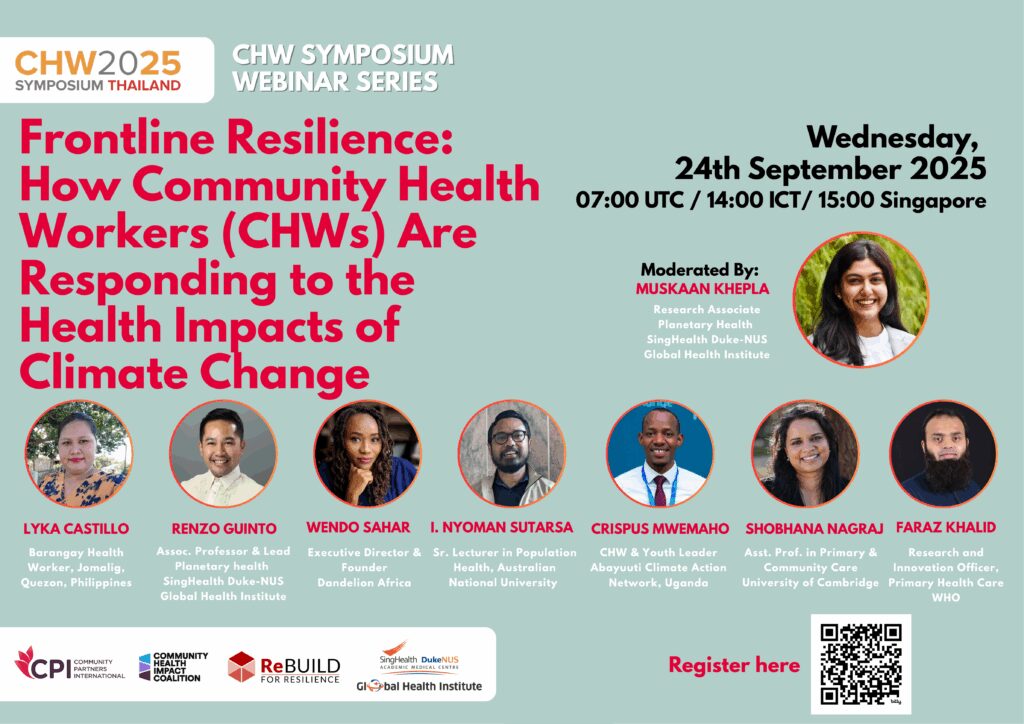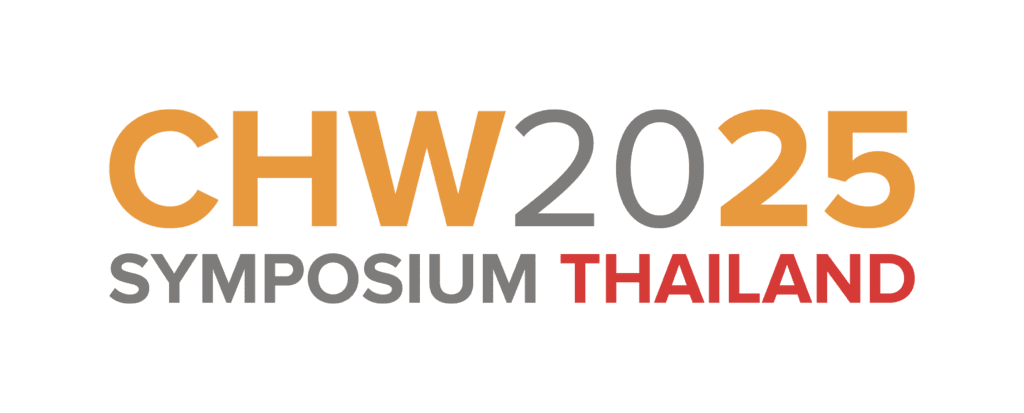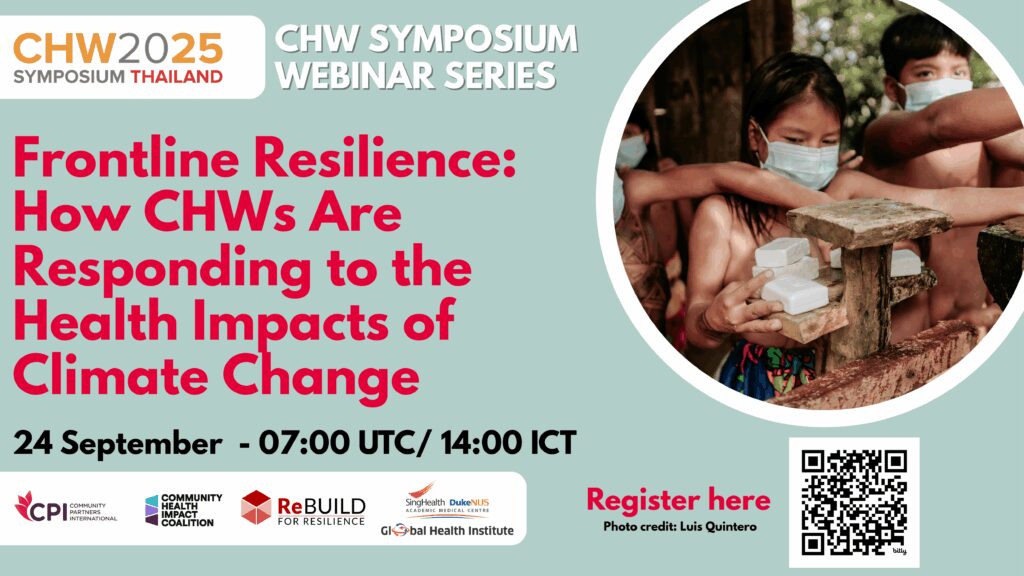Following the successful conclusion on the Gender Webinar , the Research Webinar, and the Sustainable Financing Webinar, the CHW Symposium webinar series now turns to its next critical theme: Climate Change and Community Health. This webinar seeks to shine a spotlight on CHWs’ evolving role at the intersection of climate and health, highlighting lived experiences, policy gaps, and opportunities to better equip CHWs for climate-responsive care.
Frontline Resilience: How CHWs Are Responding to the Health Impacts of Climate Change
Wednesday 24 September 2025 – 07:00 UTC / 14:00 ICT / 15:00 Singapore
The registration of this webinar is now closed.
Speakers:
- Lyka Castillo, a Barangay Health Worker from Jomalig, Quezon Province, Philippines, will share her lived experiences as a healthcare provider in one of most climate-sensitive locations in the Asia-Pacific region.
- Renzo R. Guinto, an Associate Professor and Lead of the Planetary Health Programme at SingHealth Duke-NUS Global Health Institute, Duke-NUS Medical School, National University of Singapore, is one of the world’s pioneers of the new field of planetary health and Southeast Asia’s leading voices for climate and health. Renzo will illustrate the nexus between climate and health, sharing his perspectives on the new realities of CHWs amidst this emerging crisis.
- Wendo Sahar is the Founder and Executive Director of Dandelion Africa, an innovator that focuses on improving the health and economy of women in rural arid communities. She will share a case study and insights from women CHWs in Kenya.
- I. Nyoman Sutarsa is a Senior Lecturer in Population Health, Medical School, Australian National University, and the Department of Public Health and Preventive Medicine Udayana University, Indonesia. He is a public health physician, with extensive work experiences across academia, government and national and international non-government institutions. He will share a case study on CHWs and PHC in Indonesia.
- Crispus Mwemaho is a professional medical clinical officer and a passionate climate mobility and health justice activist. He is a co-founder of Abayuuti Climate Action Network, a youth non profit, which works on climate mobility issues with a focus on mainly Livelihood Support for climate-displaced communities, Migration Environment and Climate Change (MECC) policy advocacy and community engagement, and research on climate mobility intersections. He will share a case study on Youth CHWs in Uganda.
- Shobhana Nagraj is an Assistant Professor in Primary & Community Care and works in partnership with the East London NHS Foundation Trust (ELFT). She leads the Global Primary & Community Care group (GPACC) within the Department of Public Health & Primary Care. She will share insights on CHW programs and applications on climate actions.
- Faraz Khalid manages the collaborative learning and knowledge
management workstream within WHO’s Special Programme on Primary Health Care at Headquarters. He previously coordinated the Universal Health Coverage Partnership at WHO’s Eastern Mediterranean Regional Office, supporting 14 countries. He will share his insights on PHC and CHWs in the era of climate change.
Meet our moderator:
Muskaan Khepla is a Research Associate at the Planetary Health Initiative at the Singhealth Duke-NUS Global Health Institute. She holds a Master of Public Policy from the National University of Singapore, specialising in economics and development.
Once again, this session will begin with a welcome remark by Siyapah Surathumrong, Sr. CHW Symposium Manager, from Community Partners International.
Background
The health impacts of climate change are accelerating and intensifying, disproportionately affecting communities in low-resource, high-risk settings. From heat stress and flood-induced injuries to malnutrition and vector-borne disease outbreaks, climate change is fundamentally reshaping health needs and straining already fragile health systems. In this context, Community Health Workers (CHWs) , as trusted, embedded actors within their communities, are emerging as essential first responders while also directly affected by climate change themselves. Their proximity to populations, local knowledge, and ability to deliver culturally appropriate care uniquely position them to mitigate, monitor, and respond to climate-related health threats. Despite their growing involvement in climate-adjacent health work, CHWs remain largely unsupported and unrecognized in national climate adaptation and health resilience strategies. This webinar seeks to shine a spotlight on CHWs’ evolving role at the intersection of climate and health, highlighting lived experiences, policy gaps, and opportunities to better equip CHWs for climate-responsive care.
The registration of this webinar is now closed.
Resources and Materials
- 24.09.25 CHW x Climate Webinar_Slide Deck
- Implementing the PHC approach: A Primer. This 2024 publication consolidates the global evidence on implementation and is a guide on the “how” of PHC, combining, as it does, best practices, and the tacit knowledge that countries have generated, with more formal research and analysis.
Further information
This webinar is especially co-organized by SingHealth Duke-NUS Global Health Institute,. This is part of a global series hosted by Community Partners International, in collaboration with ReBUILD for Resilience, SingHealth Duke-NUS Global Health Institute, and Community Health Impact Coalition, in the lead-up to the 4th International Community Health Workers Symposium, which will take place virtually on 10-14 November 2025. Please visit their websites to learn more about their works and contributions on CHWs and Global Health.


